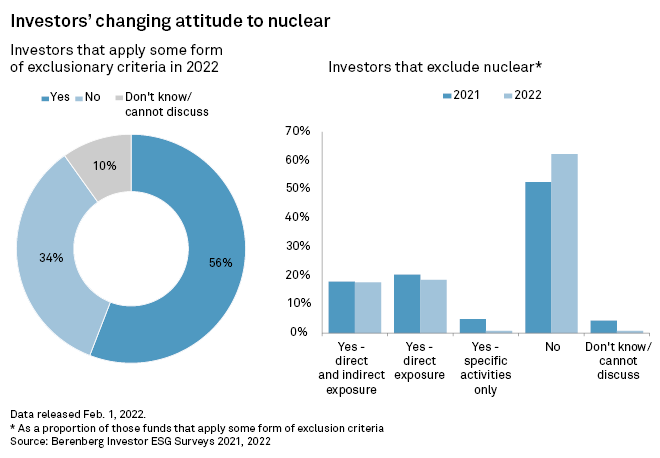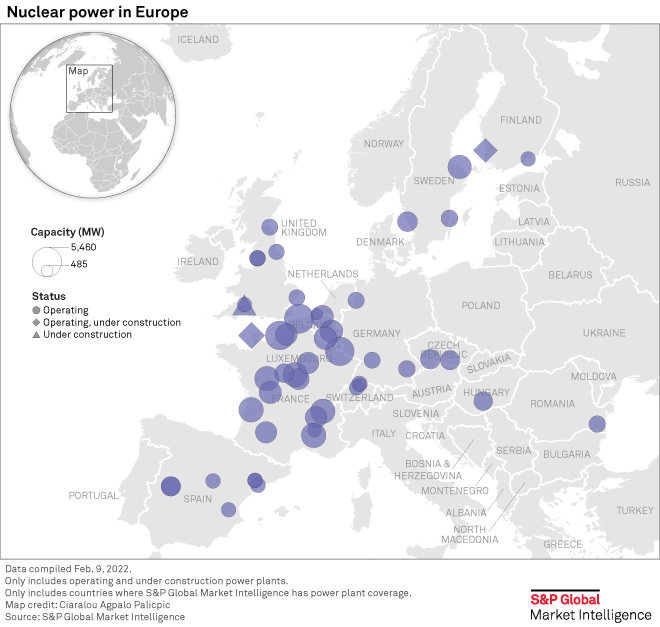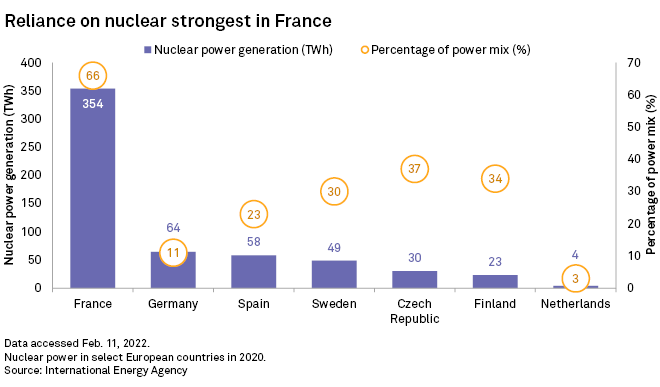Europe's ethical investors may soften their attitude toward nuclear power after the carbon-free technology won EU recognition as a sustainable activity.
Nuclear will join the EU's green taxonomy next
year, potentially easing investor concerns about whether it should be
considered environmentally friendly. The move could in turn open new
funding sources for European nuclear operators, such as Electricité de
France SA, or EDF, and Fortum Oyj, as the industry faces up to €550
billion of investment needs through 2050, based on EU forecasts.
"The perception is shifting" among environmental,
social and governance investors, said Marina Petroleka, global head of
ESG research at Sustainable Fitch. "Suddenly nuclear is back in the
conversation."
The new green status adds to growing momentum for
the power source in Europe as technology developments and greater
appreciation for nuclear's ability to consistently supply carbon-free
power increasingly outweigh traditional worries about radioactive waste
and safety levels. The conflict in Ukraine may further accelerate the
trend by heightening concerns about Europe's reliance on Russian gas.
Paring this dependence will likely require "a
comprehensive energy mix," said Guillaume Mascotto, head of ESG strategy
at Jennison Associates, an investment company. That includes prolonging
the life of nuclear plants, as well as using renewables and LNG,
Mascotto said.
In a potential first sign of this trend, Fortum
said March 3 it planned to extend the lifetime of two units of its
Loviisa nuclear power plant in Finland to 2050.
Changing investor attitudes
The EU's taxonomy is "clearly setting the
expectations and setting a guide," said Kenneth Lamont, a senior
research analyst at Morningstar. It will help establish the parameters
for nuclear investments and could boost public confidence in the
technology in the longer term, Lamont said.
The green finance rulebook may help ease investor
concerns about nuclear because it sets out strict safety and
environmental criteria that must be met for a project to be labeled
green, Goldman Sachs analysts said in a January note.
A shift in investor attitude is already underway,
with only 37% of funds with exclusions now barring nuclear assets,
according to a Berenberg ESG survey of more than 200 fund managers in
Europe and North America. That is down from 43% in a similar survey a
year earlier, the investment bank said in a Feb. 1 note.

Nuclear's inclusion in the green taxonomy could
further boost acceptance, providing a spur to shares of EDF and Fortum,
which are both involved in constructing new projects, Berenberg said.
The investment bank also highlighted Enel SpA, Iberdrola SA and E.ON SE, which have direct or indirect exposure to existing plants scheduled for closure, as potential winners from the change.
Admission to the EU taxonomy could let European
nuclear developers sell green bonds to help fund new plants, which was
previously unheard of in the region, said Petroleka.
That would potentially cut borrowing costs for
huge spending programs due to investor demand for ESG assets. Canadian
generator Bruce Power Inc., which sold what it said was the world's
first green bond for nuclear power in November 2021, estimated that the
bond carried a 3-basis-point "greenium," reflecting the funding cost
advantage associated with a green label. The C$500 million issue was
5.6x oversubscribed.
The Bruce Power bond has spurred interest in green
finance for nuclear and the taxonomy will likely encourage investors
further, said Christa Clapp, managing partner of Cicero Shades of Green.
The Norwegian green-bond rating provider endorsed the Bruce Power
security.
Easing capital access
A more open-minded investor attitude in light of
the taxonomy inclusion will help European nuclear companies including
EDF, said Antonio Totaro, deputy head of Europe, the Middle East and
Africa utilities and transport at Fitch Ratings.
EDF is funding U.K. plant Hinkley Point C and
French reactor Flamanville 3 through its own balance sheet for a total
of about €40 billion, Totaro said. But for new plants, including the
proposed Sizewell C plant in the U.K., it envisages going to the market
for a large part of the funding, which may be supported by the taxonomy,
he said.
The French government, the majority shareholder of
EDF, could also issue sovereign green bonds for nuclear power,
according to Thomas Gillet, associate director for sovereign and public
sector ratings at Scope Ratings. The addition of nuclear to the EU
taxonomy is credit positive for France, Europe's biggest user of nuclear
power, Gillet said in a January note.

Companies developing new technology for nuclear
will likely also be placed to attract more ESG-labeled investments in
the future. The development of smaller, flexible reactors that generate
considerably less waste would be an "interesting perspective" for
investors such as Pension Denmark, said Jan Kæraa Rasmussen, its head of
ESG. The Danish pension fund, which manages €40 billion in assets, may
start to invest in nuclear once the new technology becomes scalable, he
said.
The French treasury department declined to say
whether it would consider offering green bonds to support nuclear
generation. Its current green-finance framework does not cover the
technology. EDF declined to comment on the taxonomy.
Fortum said it welcomes nuclear's addition to the
taxonomy as a "crucial step toward European energy transition." Nuclear
can help mitigate climate change because it provides baseload low-carbon
power not subject to volatility like wind and solar.
Risks remain
Still, not all investors will start to accept
nuclear just because it is on an EU list. The bloc's own lending arm,
the European Investment Bank, for instance, has already said that it has
no intention of financing nuclear.
Many green funds will likely stay away too, said
Isobel Edwards, investment analyst for green bonds at NN Investment
Partners. "We already have policies, which we don't change based off the
EU announcements," she said.
Investors are in particular concerned with
reputational risk and possible accusations of "greenwashing" from
environmental campaigners.

Opposition to nuclear remains strong in countries
such as Germany, Austria and Luxembourg, which all opposed adding
nuclear to the taxonomy. Germany is shutting its last reactors at the
end of this year. Some energy experts and environmental groups are also
against the change.
This may put investments at risk as opponents will
likely seek to challenge and sue new projects, said Alain Vallée,
president at French consultancy NucAdvisor, who spent three decades at
French nuclear giant Framatome. "Having nuclear included inside the
taxonomy will not stop the fight of several countries against nuclear
energy," Vallée said.
For now, the opposition is unlikely to have the
required numbers to prevent member states and the European Parliament
from signing off on nuclear's addition to the taxonomy, according to
Berenberg.
Financial concerns may also deter investors from
putting money into nuclear. Plants have vast up-front costs, and there
is a long wait for profits due to lengthy development and construction
times, particularly in comparison to renewables. Recent new-builds,
including the Finland's Olkiluoto nuclear plant, France's Flamanville 3
and the U.K.'s Hinkley Point C, all suffered from huge delays and cost
overruns.
Such issues further complicate both efforts to
raise investment for nuclear and policy makers' reliance on the
technology to meet environmental goals. The European sector will need to
draw €500 billion of investments into new-generation power stations by
2050 and a further €50 billion into existing plants to achieve the EU's
net-zero objective, European Commissioner Thierry Breton said in
January.
Still, nuclear's entrance into the EU taxonomy
should provide some help by at least opening the door to funding from
the ESG sector.
The change will allow "more nuanced views" of
nuclear, analysts at Goldman Sachs said in the January note. It could
mark the "beginning of a shift away from traditional hardline investment
exclusions."
S&P
© S&P - Standard and Poor
Key

Hover over the blue highlighted
text to view the acronym meaning

Hover
over these icons for more information

Comments:
No Comments for this Article